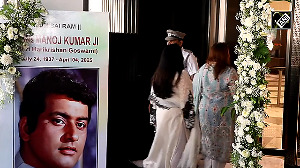 The mandatory $50-million (Rs 250-crore) back-end investment to be made by foreign multi-brand retail chains, such as Walmart, Carrefour and Tesco, would not be restricted to greenfield (new) facilities alone.
The mandatory $50-million (Rs 250-crore) back-end investment to be made by foreign multi-brand retail chains, such as Walmart, Carrefour and Tesco, would not be restricted to greenfield (new) facilities alone.
Department of Industrial Policy & Promotion Secretary Saurabh Chandra told Business Standard that a foreign retail chain was free to buy a brownfield (existing) facility but it would need to invest at least $50 million “towards creating additional back-end infrastructure there”.
Greenfield units relate to areas where no previous facilities existed, while brownfield ones are those often under-used projects that have potential for re-development.
In effect, a foreign player can tie up with an Indian retailer that already has back-end infrastructure, provided it makes the mandatory investment in creating additional facilities to strengthen the cold chain.
While American chain Walmart is in a JV with the Bharti group for wholesale outlets, the two have been in talks to extend the partnership in retail as well. UK-based Tesco, which is in a tie-up with the Tatas for wholesale, may also widen the scope of partnership.
Its representatives are likely to meet Commerce Minister Anand Sharma on Friday.
Ever since the government allowed up to 51 per cent foreign direct investment in multi-brand retail late last year, global brands keen to set up stores in the country had raised doubts over the policy, especially over back-end investment. According to the policy, “the minimum amount to be brought in as FDI by a foreign investor would be $100 million.
At least 50 per cent of the total FDI brought in shall be invested in back-end infrastructure within three years of the first tranche of FDI.”
The policy is quiet on whether the investment must go into new back-end or existing facilities like cold storage.
Other issues around which these chains had been seeking clarifications include 30 per cent sourcing from medium and small enterprises and state-wise
One major reason why FDI had been allowed in retail was that the global brands must create cold chains and other infrastructure facilities through back-end investment in India, pointed out a source in the government, adding that retail back-end at present was extremely weak in the country.
Explaining why there had been no application so far from multi-brand retailers, DIPP’s Chandra said: “Business decisions take time.”
Citing the example of Swedish furniture chain IKEA, he said it had been sourcing from India for several years, but it decided to bring its stores to the country only when its sourcing touched $400 million.
Similarly, UK-based supermarket chain Sainsbury’s and Turkey’s Migros set up sourcing bases in India, perhaps to test the waters in the country before bringing their stores, he added.
However, Arvind Singhal, founder and chairman, Technopak Advisors, a leading retail consultancy, said: “Every multi-brand retail chain does not require back-end investment worth $50 million.”
Also, most retail chains across the world do not invest in back-end themselves.
Usually, third parties invest in these, according to Singhal.
CLEARING THE AIR
- Govt says foreign retailers can invest in existing back-end units, too, provided they put up to $50 million in creating new facilities
- Retailers had been complaining about ambiguity over creation of back-end infrastructure in the foreign direct investment policy
- According to DIPP, creating additional infra is the main objective of the policy
- Govt wants foreign retailers to complete linkages, because existing infra is weak and inadequate
- FDI policy does not clearly say whether foreign investment should go to new back-end facilities only or existing ones, too











 © 2025
© 2025